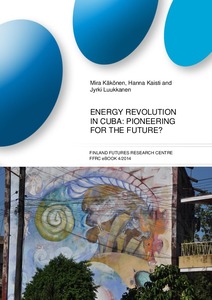| dc.contributor.author | Käkönen, Mira | |
| dc.contributor.author | Kaisti, Hanna | |
| dc.contributor.author | Luukkanen, Jyrki | |
| dc.date.accessioned | 2019-05-21T08:02:55Z | |
| dc.date.available | 2019-05-21T08:02:55Z | |
| dc.date.issued | 2019-05-21 | |
| dc.identifier.uri | https://www.utupub.fi/handle/10024/147487 | |
| dc.description.abstract | The aim of this report is to make Cuban energy reforms more widely known. Cuba has succeeded in achieving high human development index while keeping its ecological footprint small. This is largely because of the low energy consumption in the country. At the same time the electrification rate is one of the highest in the Caribbean region. Even at the time of energy crisis the electrification continued in the remote rural areas, mostly based on renewable energy sources and having priorities set in electrifying schools, health centres and communal centres. | - |
| dc.language.iso | eng | - |
| dc.publisher | fi=Turun yliopisto. Turun kauppakorkeakoulu|en=University of Turku, Turku School of Economics| | - |
| dc.relation.ispartofseries | FFRC eBooks | - |
| dc.title | Energy Revolution in Cuba : Pioneering for the Future? | - |
| dc.identifier.urn | URN:NBN:fi-fe2019052116333 | - |
| dc.relation.issn | 1797-1322 | - |
| dc.contributor.faculty | fi=Turun kauppakorkeakoulu|en=Turku School of Economics| | - |
| dc.contributor.department | fi=Tulevaisuuden tutkimuskeskus|en=Finland Futures Research Centre| | - |
| dc.format.content | fulltext | - |
| dc.relation.numberinseries | 4/2014 | - |
